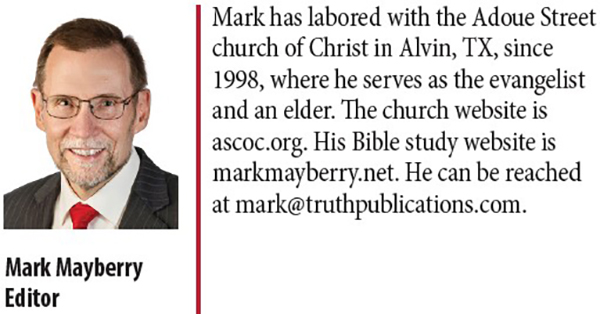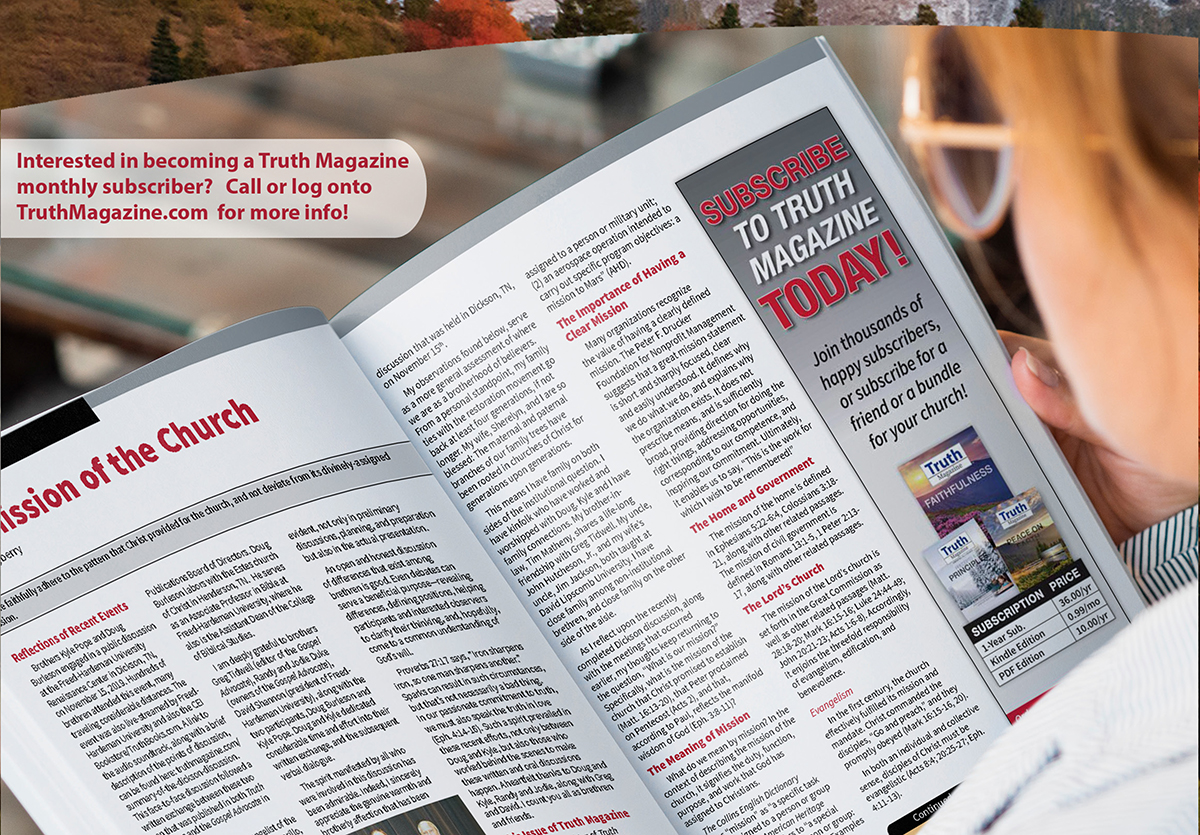
by Mark Mayberry
Synopsis: During the first trimester of 2021, I have been helping team-teach a teenage boy’s class on “Becoming Men.” As Jesus grew in wisdom and stature and favor with God and man, we must also.
Webster defines “competence” as “(1) a sufficiency of means. . . (2) the quality or state of being competent. . .” One who is competent possesses the “requisite or adequate ability or qualities” necessary to function, such as “a competent teacher, etc.” It means that someone has the ability to function in a given capacity, or possesses the talent necessary to achieve/accomplish some goal or task.
James Hasting’s Dictionary of the Bible offers this comment on “Ability”:
Both in OT and NT ability occurs in two senses, which must be distinguished: (1) It signifies material capacity, resources, wealth (Ezra 2:69; Acts 11:29). (2) It signifies personal capacity, strength of body or of mind (Dan. 1:3-4: Matt. 25:14-15). In modern English, ability is almost confined to mental capacity, though one hears it locally used of physical strength (Hastings, 9).
Consider also the following quotes on this subject:
Natural abilities are like natural plants that need pruning by study—FRANCIS BACON, Essays.
The winds and waves are always on the side of the ablest navigators—EDWARD GIBBON, The Decline and Fall of the Roman Empire.
Intelligence is quickness to apprehend as distinct from ability, which is capacity to act wisely on the thing apprehended—ALFRED NORTH WHITEHEAD, Dialogues.
God blesses each individual with differing abilities, and He holds us responsible for how we use these various gifts (Matt. 25:14-18). When tempted to excuse ourselves from fulfilling a duty, recall the rebuke that God administered to Moses, when he was similarly evasive (Exod. 4:10-17). Commissioning the aged shepherd, the Lord said, “Come now, and I will send you to Pharaoh, so that you may bring My people, the sons of Israel, out of Egypt.” Seeking to excuse himself, Moses said, “Please, Lord, I have never been eloquent, neither recently nor in time past, nor since You have spoken to Your servant; for I am slow of speech and slow of tongue. Yet, God responded, “Who has made man’s mouth?”
On special occasions, God directly/supernaturally endowed men to perform various tasks (Exod. 35:30-7). He filled Bezalel and Oholiab with wisdom, understanding, and knowledge for constructing the sanctuary (Exod. 35:30-36:7). Despite his youth and inexperience, God empowered Jeremiah to serve as a prophet: “Behold, I have put My words in your mouth. See, I have appointed you this day over the nations and over the kingdoms, to pluck up and to break down, to destroy and to overthrow, to build and to plant” (Jer. 1:4-10).
In ordinary circumstances, God calls us to serve, to labor, to fulfill some important task. Although He does not directly intervene or divinely empower us, He provides us with the ability, intellect, and strength to accomplish His purpose. “Who has made man’s mouth? Or who makes him mute or deaf, or seeing or blind? Is it not I, the LORD?” He forms the ear and the eye (Ps. 94:9). He bestows life and breath.
According to Wikipedia, a “duty” (derived from Latin, signifying “debt“) “is a commitment or expectation to perform some action in general, or if certain circumstances arise.” Diligence demands that we use our talents, cultivate our abilities, and take advantage of opportunities as they arise (Eph. 5:15-16; Col. 4:5).
While the famous expression, “Carpe diem,” (Latin: “pluck the day” or “seize the day”) is attributed to the Roman poet Horace and communicates the importance of taking advantage of opportunities, Solomon stressed the same point centuries earlier (Eccl. 11:6). We may enjoy greater or lesser success based upon the uncertainties of life (i.e., time and chance), yet we must heed the admonition: “Whatever your hand finds to do, do it with all your might. . .” (Eccl. 9:10-12). Let us, therefore, emphasize diligence over dereliction: In serving the Lord, we must be fervent in spirit (Rom. 12:9-13).
Sometimes, our work ethic can be deficient or based on the wrong set of motivations, such as prideful competitiveness or grasping covetousness (Eccl. 4:4). Not only should we do our best when the task is stimulating, captivates our interest, or is personally advantageous or appealing. Instead, let us do our best under all circumstances (Col. 3:23-24).
Young folks, ask yourselves: How do you respond when your parents ask you to work when you would rather play? Are you sullen and vexed? Are your efforts half-hearted or all-together inadequate? Learn to manifest the proper attitude when assigned chores. What if your dad griped and complained when the boss assigned an added responsibility to his already full workload? What if he acted like children sometimes do when they are asked to perform chores? He would probably be fired, and you could not enjoy all the comforts and pleasures and possessions that you take for granted. Plus, you would lose your allowance!
Many young men dream of independence and wealth. They hope to drive an expensive car, live in a pleasant neighborhood, and marry a beautiful woman. None of that will happen if they are lazy and listless, content to live in their parent’s basement and play video games until they reach the age of thirty.
To achieve true independence, to gain a certain degree of wealth, to attract a beautiful (and hopefully godly) woman, young Christian men need to cultivate their character, and develop the physical/intellectual/spiritual skill sets that will enable them to provide for a family.
Were you raised in a family where your mother was not required to work outside the home, where both parents provided a wholesome spiritual environment? Was this a blessing? Do you want to raise your children under similar circumstances? If so, you need to develop the skill sets (physical, intellectual, spiritual) that will make all of this possible.
“The leech has two daughters, ‘Give,’ ‘Give’” (Prov. 30:15a). Many are looking for a free lunch, a handout, etc. While we remain dependent upon God, He calls us to self-sufficiency: “God is able to make all grace abound to you, so that always having all sufficiency in everything, you may have an abundance for every good deed. . .” (2 Cor. 9:6-15, esp. v. 8). The Greek word autarkeia, here translated “sufficiency” is elsewhere rendered “contentment” (1 Tim. 6:6), and signifies a spirit of “self-satisfaction, i.e., self-sufficiency” (Thomas, 841). While we remain dependent upon God, let us bear our own burdens, striving for self-sufficiency in our relation to others.
In order to fulfill our various obligations (providing for our family, contributing to the Lord, paying our taxes, helping those in need, etc.), we must be active and industrious, honest and reliable, dedicated to serving others, always striving for excellence (Eph. 4:28; 1 Thess. 4:9-12; 2 Thess. 3:6-13).
As believers, let us learn to engage in good deeds to meet pressing needs (Titus 3:8, 14). Serving the Lord, contributing to the needs of the saints, and practicing hospitality all require resources (Rom. 12:9-13). Members of the Jerusalem church manifested a sacrificial spirit (Acts 4:32-35), as did the saints in Antioch (Acts 11:27-30) and Christians in Macedonia (2 Cor. 8:1-6). 
“Ability.” The Merriam-Webster Dictionary of Quotations. Springfield, MA: Merriam-Webster, 1992.
“Duty.” Wikipedia. Wikimedia Foundation. September 29, 2020. https://en.wikipedia.org/wiki/Duty.
Hastings, James. “ABILITY,” A Dictionary of the Bible: Dealing with Its Language, Literature, and Contents Including the Biblical Theology. Edited by James Hastings et al. New York; Edinburgh: Charles Scribner’s Sons; T. & T. Clark, 1911-1912.
Merriam-Webster’s Collegiate Dictionary. Springfield, MA: Merriam-Webster, Inc., 2003.
Thomas, Robert L. New American Standard Hebrew-Aramaic and Greek Dictionaries: Updated Edition. Anaheim: Foundation Publications, Inc., 1998.



